Video Feature & Web-Exclusive Interview
Musician: DANA COOPER
Video: “Bluebird”
DANA COOPER IN TOP FORM
WITH NEW ALBUM I CAN FACE THE TRUTH
Like meeting an old friend for the first time, Dana Cooper’s latest release, I Can Face the Truth, rewards the homesick heart and will make you declare, ‘Finally! They actually do make them like they used to.’ Full of friendly surprises, new and nostalgic, you will find yourself wanting to lean in a little closer to hear the secrets just beyond the melody. Magically mindful!
With a voice sensitive and scarred by the beauty and tragedies of a fervent life, this tireless troubadour offers passion, unity and hope to a world longing for the innocence of an earlier time: Always hello, never goodbye—forever our lives are entwined; we turn to the sun together as one—close as the flower and the vine.
Standout tracks include, “I Can Face the Truth,” and the timely compelling “Summer in America” which will move you to the point where you can’t help but lift your voice toward the sky and let out the aching relief that reverberates inside as you sing along and smile while reminiscing of your own summer.
Cooper’s lyrics are always introspective, powerful in its subtle strength, digging and searching for answers as it echoes from the head to the heart and haunts waking dreams—all while remaining refreshingly honest: Afraid of what I’m not and what I might become; yeah, I can face the truth—but please, not today.
Other irresistible tracks include “Always Old Friends” (co-written and co-produced with Robert Weingartz), “Flower and the Vine” (co-written with Kim Richey), “Bluebird” (co-written with Tom Kimmel), “Ours for a Little While” (co-written with Elva Jones-Hahn: Everything we think we own, we borrow; this moment is so precious only ours for a little while—ours for a little while), “Walls” (co-written with Rebecca Folsom) and “I Know a Girl” (co-written with Dave Coleman)—which will again find you singing along.
Dana Cooper’s new album I Can Face the Truth is radio ready, honest, vulnerable and an incredibly formidable effort. It is Cooper at the top of his songwriting form and creative expression, with arrangements so strong it allows each listener to feel he wrote the song specifically for them.
Masterfully produced by multi-instrumentalist Dave Coleman and Cooper, this collection delivers a thoughtful spectrum of folk, rock and blues originals, as well as a refreshing rendition of the Hank Williams classic, “I’m So Lonesome I Could Cry.”
Dana Cooper is an honest and passionate veteran who has paid his dues, done the work, and whose name deserves to be on the wall beside every other great who made Americana, folk and the music of the 70’s the treasure that it is today. We talked with Cooper about his passion for songwriting and performing, what continues to inspire him, how he takes the time to listen, and how he continues to be mindful and remain hopeful.
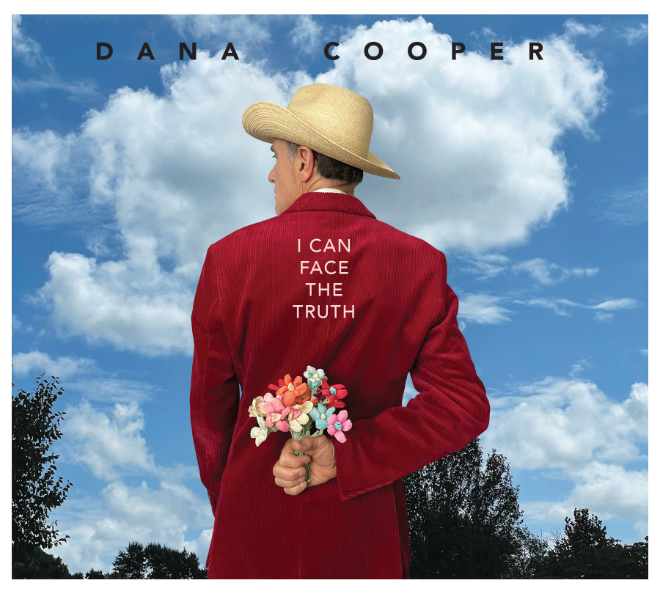
DANA COOPER Interview
with M Music & Musicians magazine publisher, Merlin David
What is one main thing you learned about yourself after recording this new album I Can Face the Truth?
I feel like I keep learning the same lessons over and over again. One of the biggest lessons I re-learned from this project was to trust my own creative instincts and those of my fellow musicians.
How did this album evolve?
One year to the date of my mother’s passing, I had a conversation with Dave Coleman after seeing his band, The Coal Men, play at The 5 Spot in East Nashville. Dave and I had met years before when he was an intern at Compass Records. Over the years, we saw each other on occasion but never really had an in-depth conversation. At The 5 Spot, I reintroduced myself to Dave and told him how much I admired his musicality. We talked for a while until he invited me to visit his Howard’s Apartment Studio and to even record a song to see how I liked it. I was flattered and excited to get together with Dave and we scheduled a visit two days later. Dave shared some other recordings he had produced with local singer-songwriters I love, Amelia White, Jon Byrd, Tim Carroll and more. I had recently finished “I Can Face the Truth” and was eager to record it. Dave and I launched into it and a few hours later, we were grinning at each other and making plans to record an entire CD.
How did the idea for the catchy title track “I Can Face the Truth” come to you?
While walking through Woodlawn Cemetery in Nashville, paying my respects to old heroes like Marty Robbins and George Jones, I was struck by the rows of bright-colored artificial flowers. Reflecting on our mortality and all our rituals to deal with it, I pulled out my pocket Moleskine and jotted down the line “cut down the flowers, lay them on the grave.” The spring day was so bright and green that I embraced the sap and promise of my own little life. I sat beneath the trees and wrote “Don’t want the sun to hide behind the cloud. I want to run and never fall down.” I had been ruminating on the confusing times we live in, how lies can be sold as truth and realizing my own inability sometimes to own up to my shortcomings. The refrain popped up in my head—“I can face the truth, but please not today.”
Dana Cooper’s new album I Can Face the Truth is radio ready, honest, vulnerable and an incredibly formidable effort. It is Cooper at the top of his songwriting form and creative expression, with arrangements so strong it allows each listener to feel he wrote the song specifically for them.
Which song somehow squeaked by and made it onto this collection?
On every one of my CDs there is an older song that has never been recorded. On this project there are two. “Bluebird,” written with Tom Kimmel is one. The other is “I’m Just Passing through Here” which I wrote around 1976. Early on, after singing the song to a friend who had a negative reaction, I rarely performed it again. A couple of years later I played it for my wife Linda Lou and she loved it. Several times I planned on recording the song but it somehow never made the cut. This time, it felt more timely than ever and the perfect summation of this collection of songs.
Who originally inspired you to write songs?
At two years old, I began singing along with the radio to artists like Hank Williams and Ernest Tubb. I asked my dad about the names beneath the songs on our albums and 45s. He told me those were the people who wrote the songs. Some of the first songwriters who inspired me to consider writing my own songs were Cole Porter, Buffy Sainte-Marie, Bob Dylan, and Lennon & McCartney.
What is your creative process for writing songs?
At the heart of songwriting is observation. As a little kid I walked through life not paying attention, looking down at the ground a lot. One morning while walking to first grade, my mom told me to look up at the world around me—to see how the morning sun shone on the power lines and through the leaves. I walk almost every day. On the road, I’ll walk at night after a gig. Sometimes around parts of cities I probably have no business being in. I always have a small notebook and pen, a digital recorder and some kind of camera. Often after gigs I’ll stay up for a few hours playing the guitar, trying open tunings, different rhythms. Nearly every day I snag some kind of lyric, melody or rhythm idea. Most of these are of no consequence but it’s important to make a record of them. Every week or so, I listen and read through the ideas, and hone in on anything that stands out.
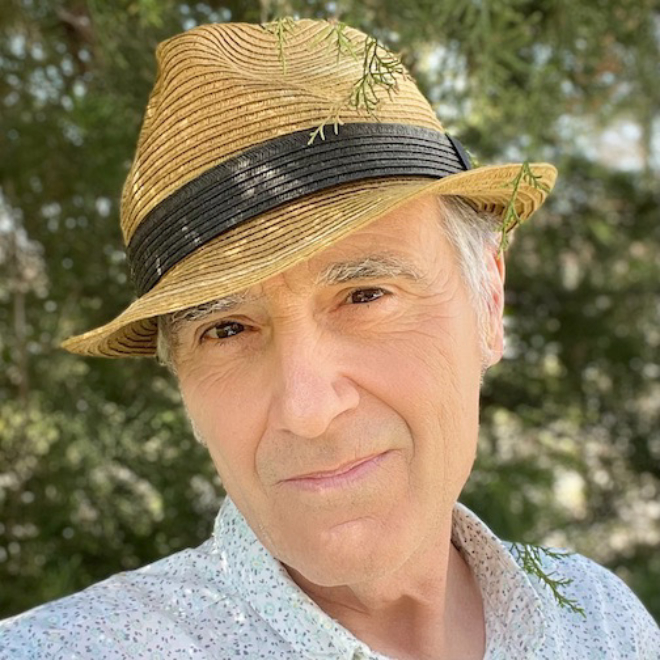
What songwriting tip would you like to offer?
Develop your powers of observation, read everything you can, watch films from all over the world, listen to every kind of music, be brutally honest in what you write, travel, ask people questions and listen to their stories, give yourself permission to write badly, push yourself to be better on your instrument, experiment with different rhythms. Make big mistakes. Do the research. Rewrite.
Which Top 5 Musicians inspired you to become a musician?
Top fives are difficult. So many people have inspired me over the years. Early on though, I’d have to say Hank Williams, Bill Haley and the Comets, Leonard Bernstein, Bob Dylan and the Beatles.
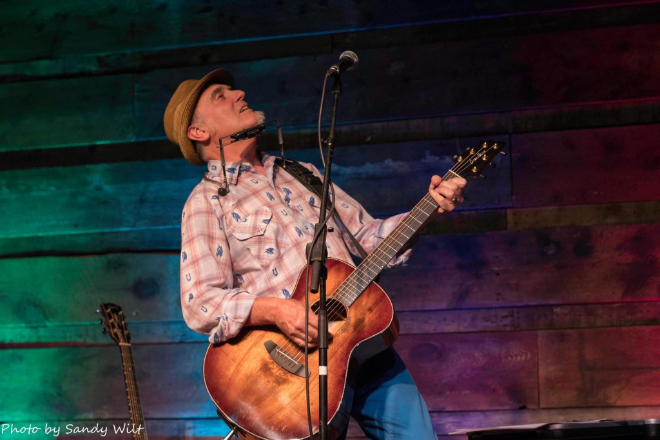
What are your Top 5 favorite albums of all time?
Many a Mile (1965) — Buffy Saint-Marie
Sgt. Pepper’s Lonely Hearts Club Band (1967) — The Beatles
The Hissing of Summer Lawns (1975) — Joni Mitchell
Talking Book (1972) — Stevie Wonder
Bringing It All Back Home (1965) — Bob Dylan
What instruments/equipment can you not live without?
My dad co-signed for me to buy my 1967 Gibson Heritage. It’s been with me ever since. I own other guitars but the Heritage is the one I never want to be without. I also treasure my old Gibson A1 mandolin, given to me by my wife and mother as a birthday gift long ago. Recently, I bought an Alvarez acoustic baritone guitar that’s been a lot of fun to dig into. I play around with a bass guitar, drums, banjo, piano—when no one is listening, harp guitar, penny whistle and harmonica. I try any instrument I can get my hands on to inspire new song ideas.
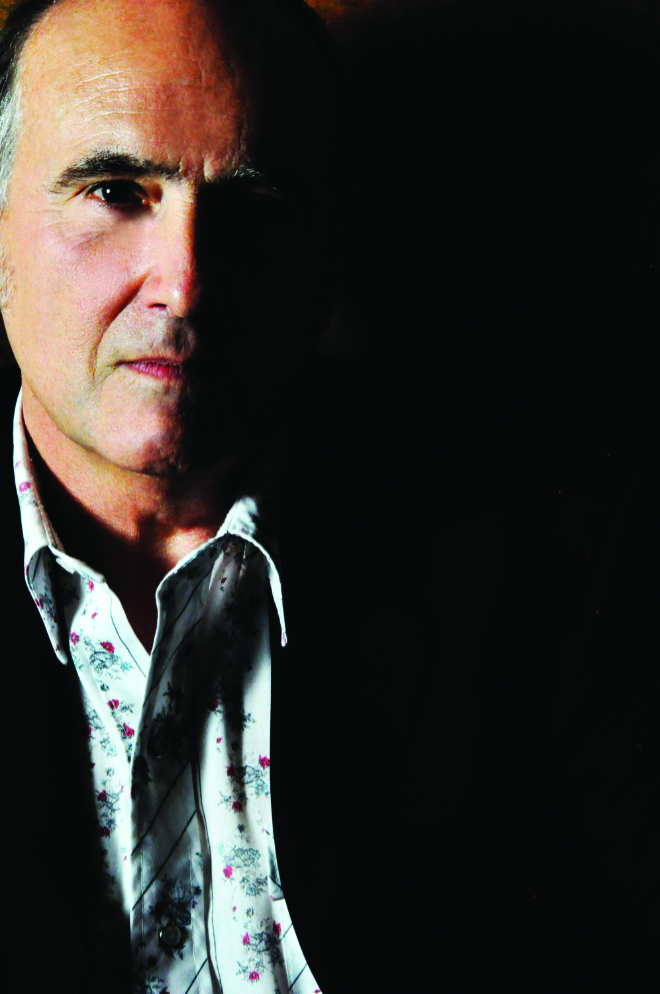
Seems like you have a new guitar.
It was love at first sight with my Breedlove—Myrtlewood—Oregon Concert Bourbon E guitar. Once I began playing the guitar I was truly hooked. The instrument sings and rings with a depth of tone I didn’t expect from its size. What I first thought would be my second guitar became my primary instrument for writing and live performance. My Breedlove is not only gorgeous to look at and to play but it’s proven to be a workhorse.
A harmonica always finds its way into some of your songs.
I played Hohner Marine Band harmonicas at the very beginning of my career. The Hohner Special 20 was a breakthrough with its powerful punch and the flexibility and durability of the reeds. The plastic soundboard doesn’t warp when soaking the harp and I love the heft of the instrument in my hand when not playing it on a rack.
Tell us a “pinch me” moment when you thought “Wow, this is really happening to me!”
For my Elektra album I had complete artistic control, something rare for a new recording artist. I chose two rhythm sections. My first pick was bassist Leland Sklar and drummer Russ Kunkel of “The Section.” Stan Farber produced the record and he knew just about everyone from his years as a member of the most in demand group of background singers in Los Angeles at the time [Ron Hicklin Singers]. Stan recommended some of famed “Wrecking Crew” musicians—bassist Joe Osborn, drummer Jim Gordon, saxophone and flute player Jim Horn, percussionist Milt Holland, vibraphonist and percussionist Gary Coleman, along with string arranger Lee Holdridge, keyboardist Michael Omartian and pedal steel player Al Perkins. We recorded all in one room together, separated by baffling to isolate our instruments but still with a clear view of one another. Looking across that room at all those incredible musicians playing and recording my songs was and remains one of the highlights of my life.
Do you remember the first time you heard one of your songs on the radio?
My eponymous Elektra album came out in 1973. First gig of the tour was opening a series of shows for Townes Van Zandt at Passim’s in Cambridge, Massachusetts. I was touring with friend and guitar accompanist Al Del Gigante. Andy, the east coast head of record promotions picked us up at the airport and drove us to a record store in Cambridge. Along the way my song “Lover, Baby, Friend” suddenly played on the car radio. It took a couple of seconds to realize it was me singing through the dashboard speakers. We pulled up to the record store and the big picture window was festooned with dozens of my LP covers. I was both excited and terrified of what was to come.
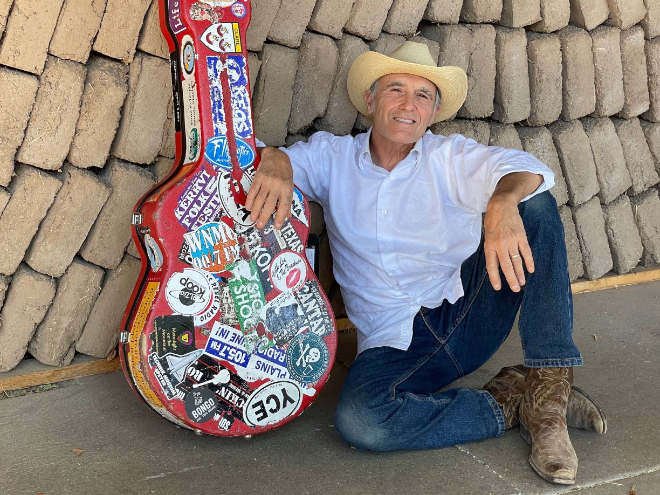
Tell us how the idea of “Laughing and Crying” came to you.
It’s a conversation with my departed mother Betty Jo. The idea came to me when I recalled one of the last times I sang a new song for Betty. The song was “Dance toward the Light” inspired by my mom and the first time she talked to me about our mortality. We sat at her old kitchen table and halfway through the song I saw that mom was so moved she began laughing and crying at the same time. I have always loved that overpowering emotion that comes when a song, or a book, or a film deeply moves me and how alive it makes me feel. Betty Jo taught me how to tap into that emotion when I was just a kid. This song is my way of paying homage to her.
What is the best advice someone has given to you?
Sister Mary De Paul told us third graders at St. Ann’s “Don’t hide your light beneath a bushel basket.” The idea was to discover what your true vocation in life was and to pursue it with dedication and perseverance. The second bit of sage advice I’ve always cherished came from fellow bandmate and keyboardist Riley Osborne who often quipped “Don’t take any of it too seriously.”
Dana Cooper is an honest and passionate veteran who has paid his dues, done the work, and whose name deserves to be on the wall beside every other great who made Americana, folk and the music of the 70’s the treasure that it is today.
In this unique socio-political climate, how do you remain hopeful?
When my heart sinks and my shoulders tense up, my mind bends and I can’t imagine what is next for the human race, I pick up a guitar and let it lead me where it will. No matter how broke or down I’ve ever been—there is no better medicine than playing music and creating a new song.
Where can new fans get more info and stay updated?
www.DanaCooperMusic.com
www.Facebook.com/Dana-Cooper-Music-100718218970427
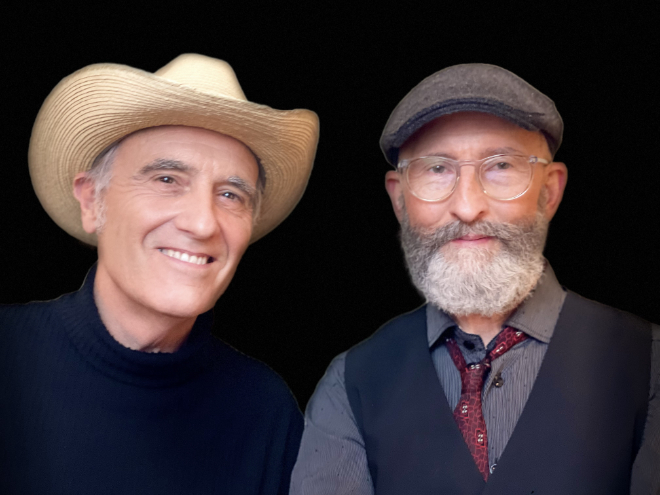
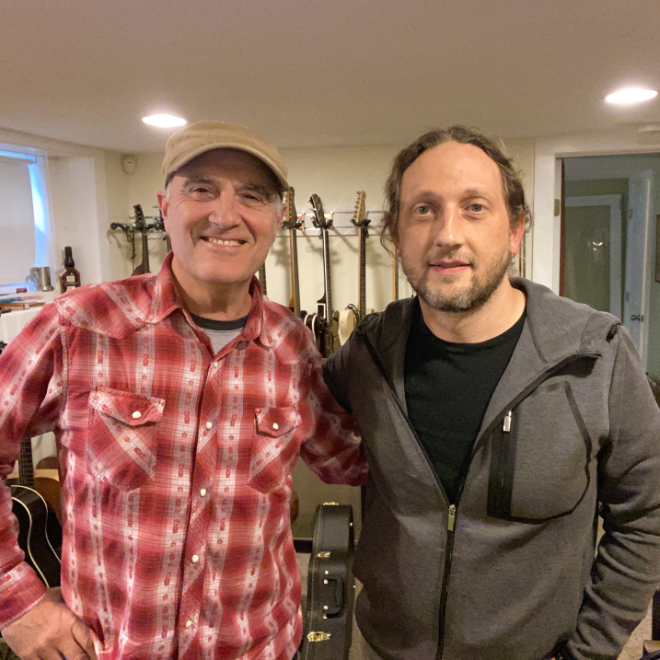
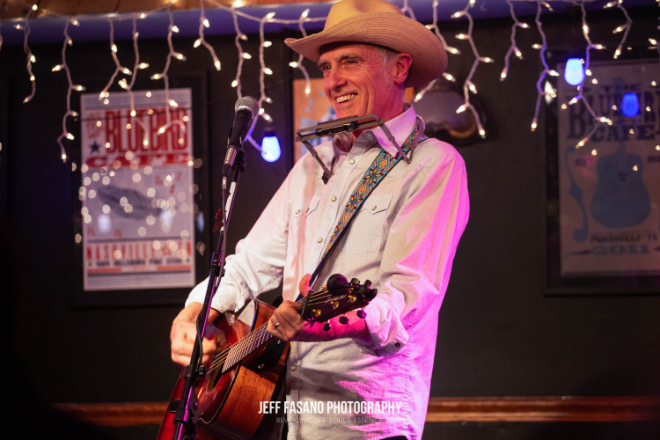



comment closed